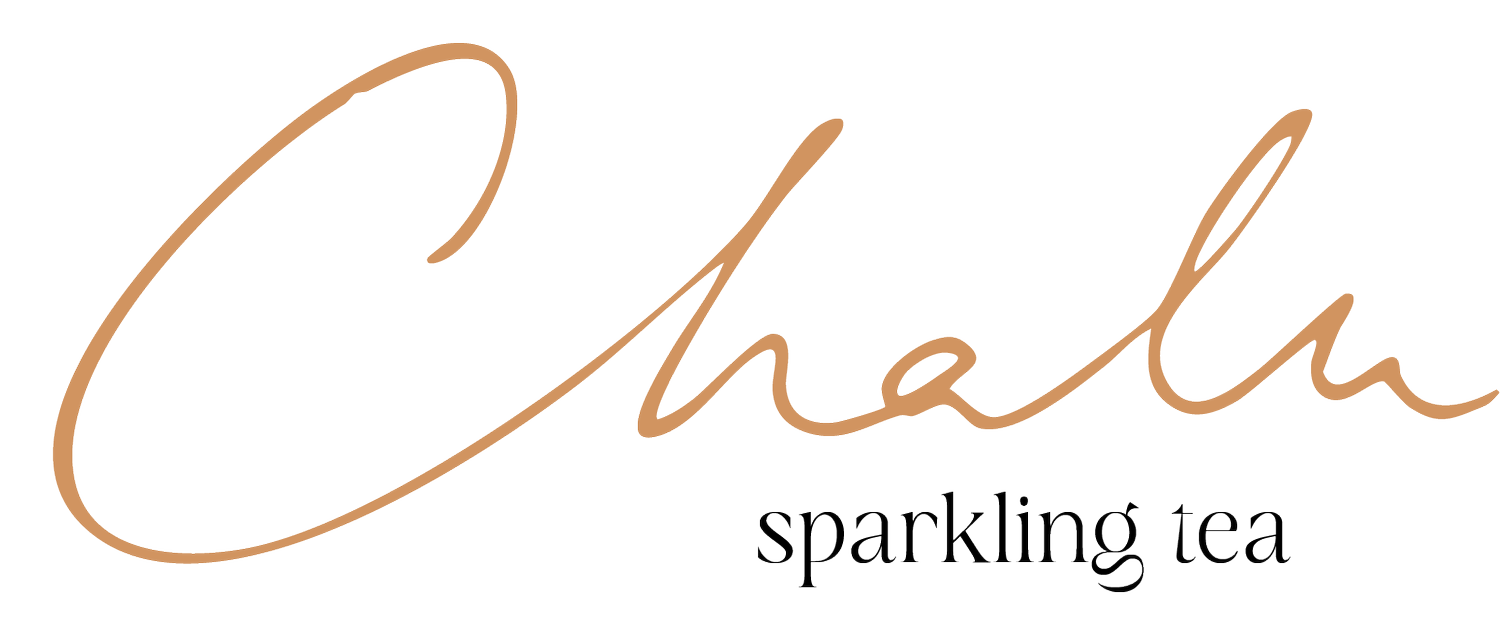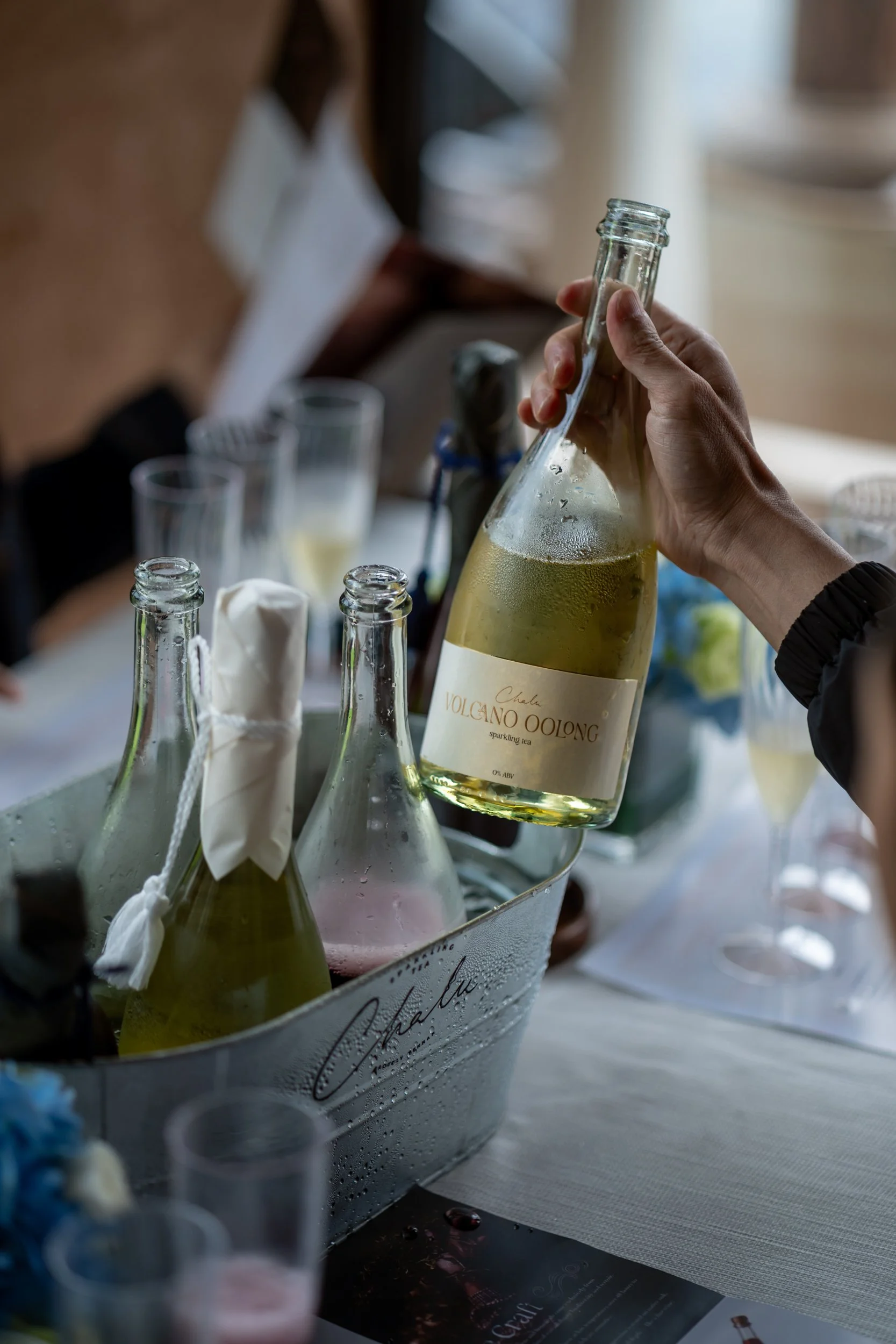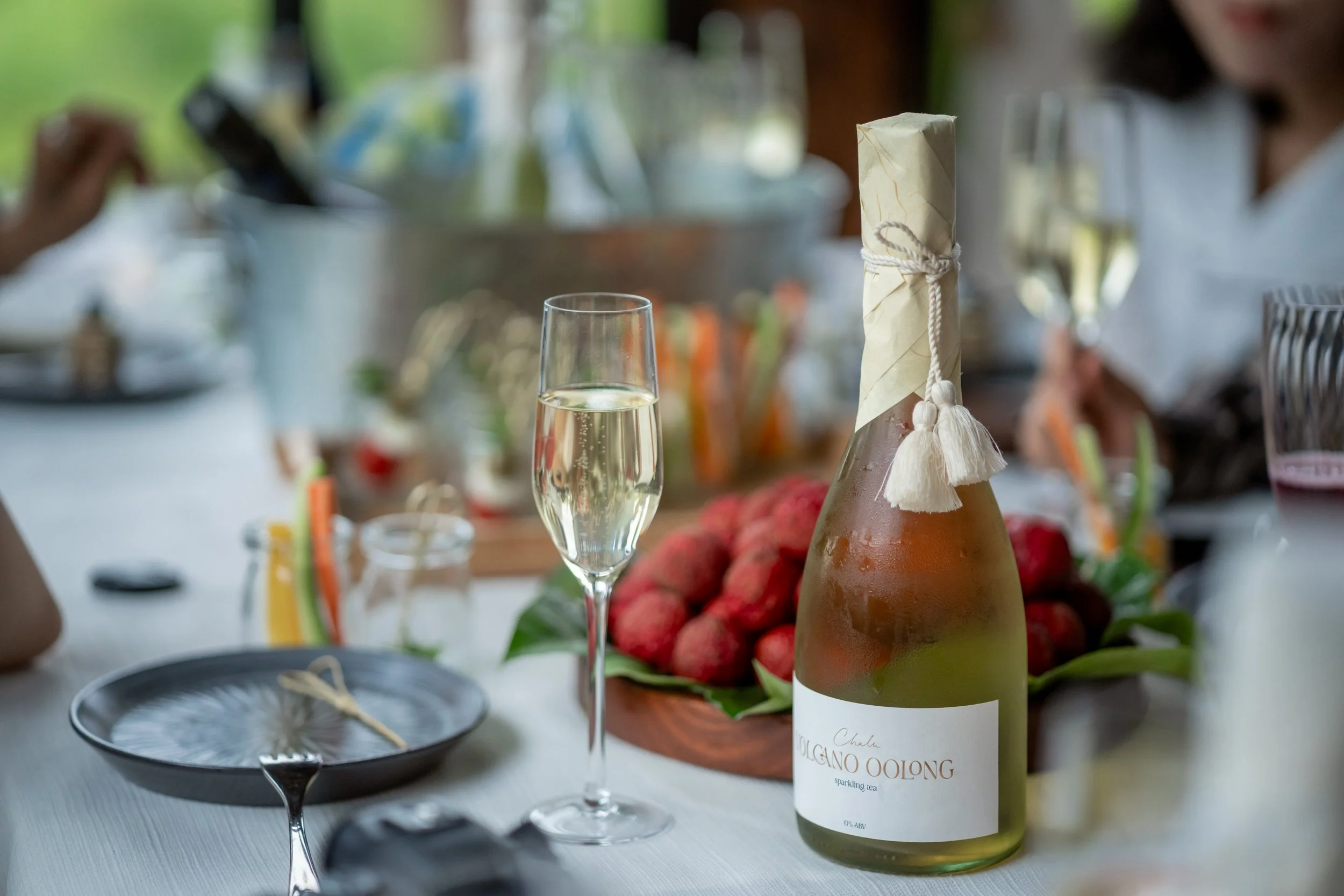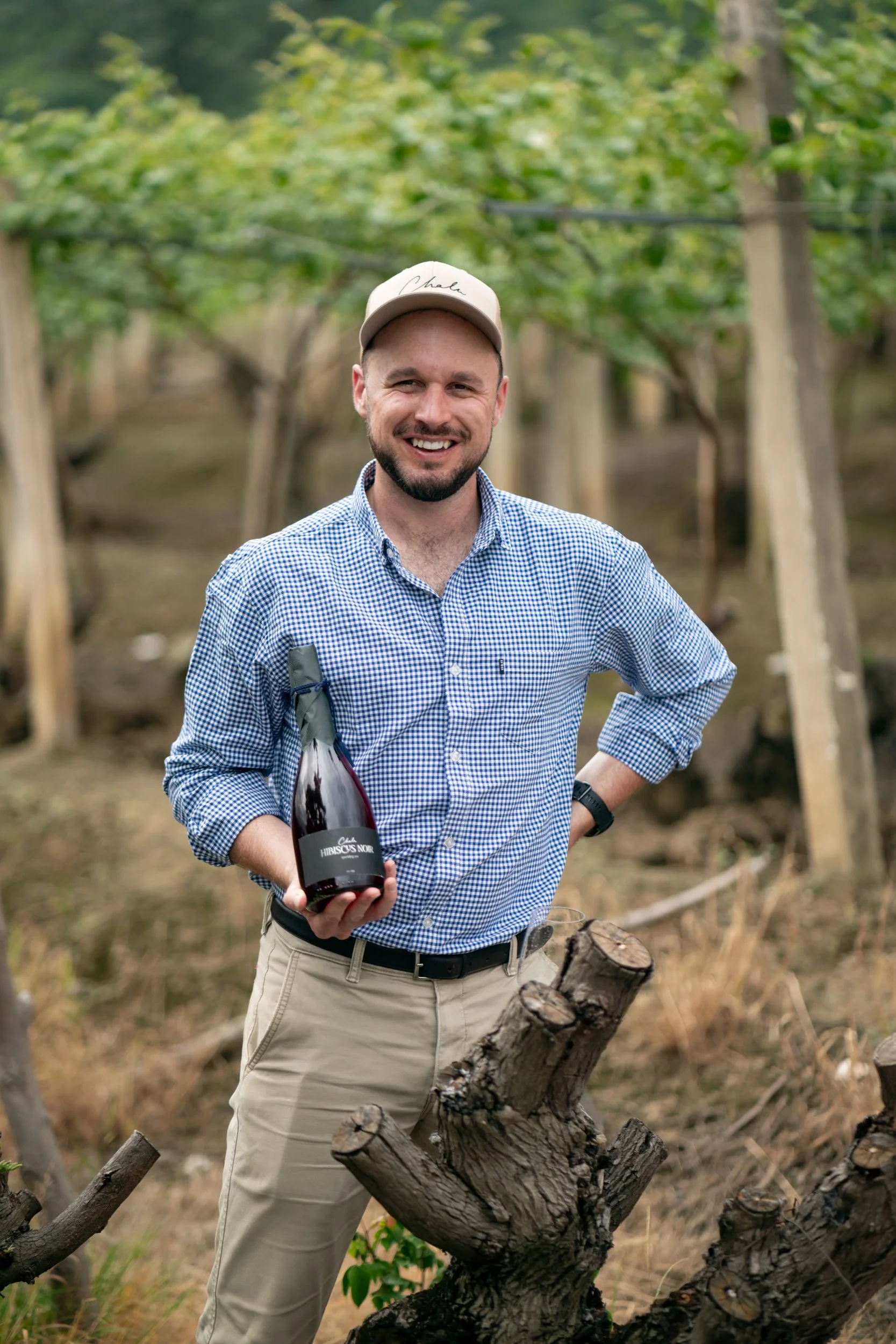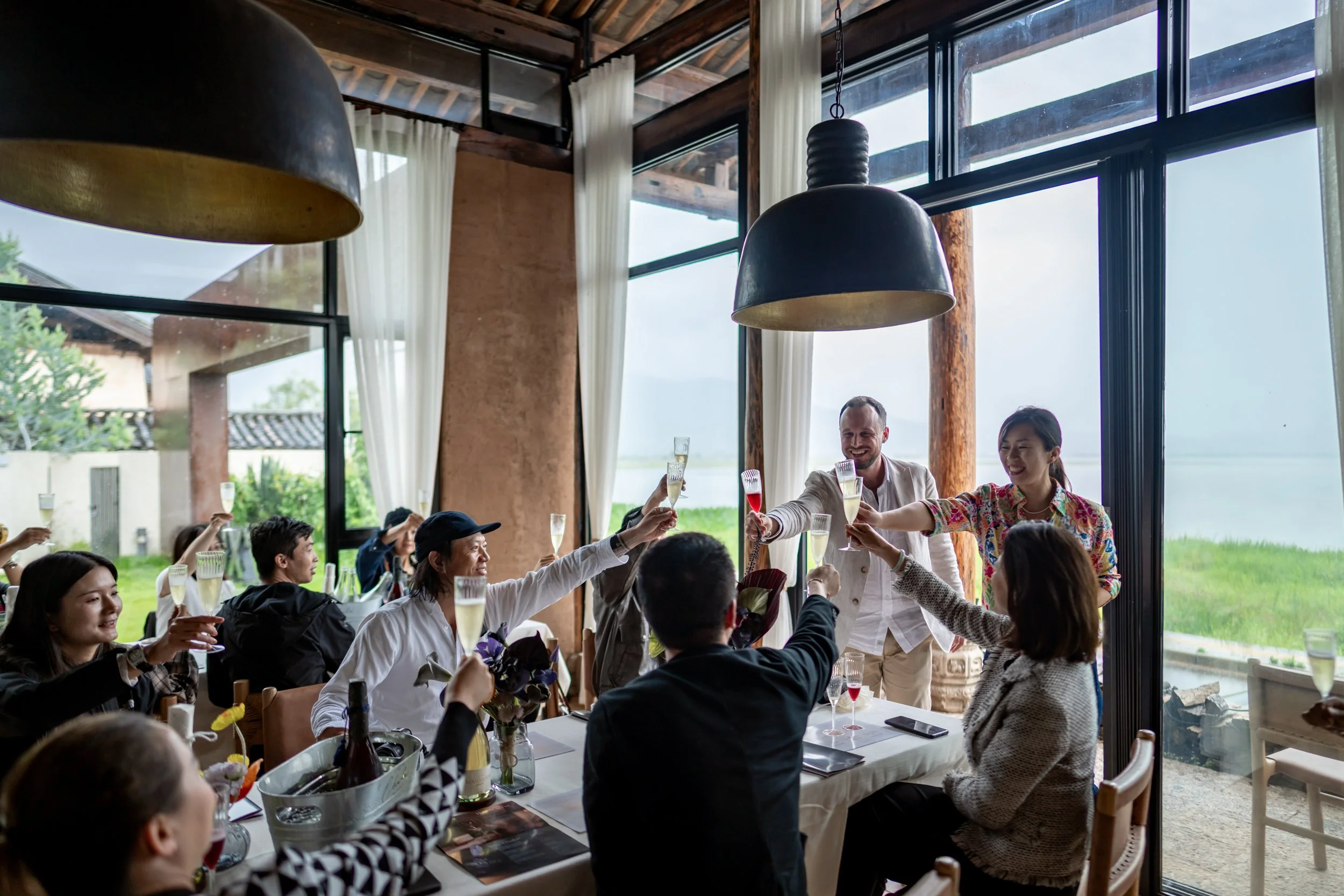Bridging the Tea Horse Road
The Bulang people are caretakers of the land in a way that resonates with the Māori concept of kaitiakitanga—guardianship, stewardship. Coming from New Zealand, that philosophy is in my bones. And being entrusted with their tea - well, it’s no longer just a business decision. It’s a responsibility. One I now carry with pride.
Every week I’m coming into contact with so many fantastic new acquaintances across the world, and it prompted a question in me this week: What have these conversations revealed to me? It got me thinking. About people. About the unexpected connections that are starting to shape this journey with Chalu in ways I never anticipated.
Most of the conversations I’ve had so far have followed a predictable format—talk of margins, A&P budgets, exclusivity, distribution terms. These are familiar from my gin days. They’re important, of course. But what’s really stayed with me are the moments that break that rhythm—moments where something human cuts through.
One such moment came from an unexpected connection I made right here on LinkedIn. A guy named Jon reached out. He lives in New York, his wife is from Kunming, Yunnan. He studied in China, and is a deep, genuine lover of Chinese tea—especially Pu’er. We jumped on a few calls, and it became clear that this wasn’t just another business conversation.
Jon surprised me. Not just because of his knowledge, which is vast, or his passion, which is contagious. But because of the question he asked:
"How do we make Yunnan tea accessible?"
It challenged me. He wasn’t just talking about prestige menus or rarefied spaces. He was talking about Pu’er tea for the masses. Big-box retail. Reaching everyone. And for a moment, that stopped me in my tracks.
Because when I imagined Chalu, I always saw it in wine bars, restaurants, curated bottle shops. But Jon made me question: What if tea didn’t have to sit behind velvet ropes? What if we stopped treating tea like an elusive mystery?
“It’s no longer just a business decision. It’s a responsibility. One I now carry with pride.”
That shift in perspective has lingered. Not in an anxious way, but in a deeply energizing one. Because I didn’t start Chalu just to build a beverage. I started Chalu to share a place.
And few places have left a mark on me like Lincang. While researching for Chalu, I spent time there with the Bulang people—one of China’s smallest ethnic groups, and, according to oral history, among the first cultivators of the Pu’er tea tree. These are not neat plantation rows. These are wild, ancient trees, some 600 to 800 years old, growing in the shade of Bingdao Mountain.
The Bulang people are caretakers of the land in a way that resonates with the Māori concept of kaitiakitanga—guardianship, stewardship. Coming from New Zealand, that philosophy is in my bones. And being entrusted with their tea - well, it’s no longer just a business decision. It’s a responsibility. One I now carry with pride.
That sense of stewardship has flowed into everything. Including our next expression—Untamed Rosé—a sparkling tea made from Bingdao white Pu’er from Lincang, and layered with nuance and love. It’s a vibrant, expressive rosé with a wild streak, just like the land it comes from. And I’ve spent countless hours making sure it respects the tea, the people, and the place.
Because that’s the point. These aren’t just transactions. These are relationships. Connections. Whether it's a distributor in Europe, a tea farmer in Yunnan, or a tea lover in New York, we’re bridging something, together.
And so, it’s time to bring Yunnan tea to the people, and Chalu is the format for doing this – inclusive, layered, perfect for celebration and ritual, anytime. I want people to taste Chalu and feel something—feel the earth of Yunnan under their feet, feel the laughter of a muddy hillside harvest, feel the pride of a centuries-old lineage. I want them to feel like they’re not just drinking some non-alc beverage. They’re becoming part of the story, not just as consumers, but stewards too.
Cheers, Fraser
A Global Shift: an open letter to the non-alc beverage industry
Last week, Gallup reported that alcohol consumption in the U.S. has dropped to its lowest level since tracking began. But this shift isn’t confined to North America. Globally, a quiet revolution is underway — and it’s changing the shape of bar menus, grocery shelves, and drinking culture at large.
Chalu Diaries pt.4
Something profound is happening in the world of drinks.
Last week, Gallup reported that alcohol consumption in the U.S. has dropped to its lowest level since tracking began. But this shift isn’t confined to North America. Globally, a quiet revolution is underway — and it’s changing the shape of bar menus, grocery shelves, and drinking culture at large.
For many, especially Gen Z, this is more than a change in preference. It’s a redefinition of ritual. A move away from autopilot consumption toward intentional choices rooted in health, identity, and community. Alcohol, once central to celebration and social bonding, is being replaced — not with compromise, but with curiosity.
At Chalu, we saw this early. When the Chinese spirits market never really returned to it’s pre-Covid glory, we realized this wasn’t a temporary dip. Spirits weren’t just cooling off — the entire conversation around drinking was shifting. What once defined modernity and progress began to feel dated. More people were choosing clarity over blur, balance over bravado.
So we pivoted — not away from alcohol out of rejection, but toward something entirely new out of opportunity.
Our sparkling teas don’t aim to echo alcoholic counterparts. We’re not creating replacements — we’re crafting originals. Beverages rooted in place, layered with complexity, and designed for the same moments of celebration and ritual as a fine wine or spirit. Every bottle is built from cold-brewed Yunnan tea, aged on oak, balanced with native botanicals, and brought to life — without a single drop of alcohol.
And we’re not alone. The non-alcoholic category is bursting with innovation. Athletic Brewing Co. . recently surpassed $90M in sales, redefining what beer can mean in a post-alc world. Sylva , based in the UK and launched by Seedlip founder Ben Branson , is crafting non-alc distillates from trees and grains — not as proxies for whisky or rum, but as a new category altogether. Partake Brewing continues to grow its footprint in Canada with a line of crisp, low-cal, non-alc craft beer alternatives. These brands are paving the way forward.
Yet despite all the progress, the road ahead remains uncertain.
In China, we see enormous opportunity. According to Mintel, more than 40% of urban Chinese consumers say they plan to reduce or eliminate alcohol consumption entirely. But while consumption is shifting, industry mindsets are slower to evolve. On the macro level, many legacy players still treat non-alc as a compliance exercise — something to tick off a list, rather than an invitation to innovate.
That’s where I believe the future lies — in creation, not replication.
Non-alc beverages shouldn’t be a repetition of something else. They deserve their own craft, terroir, and cultural language. That’s the approach we take at Chalu. We don’t make sparkling tea to fill a gap. We make it because we believe it belongs — on a bar shelf, at a dinner party, in a gift box, on the table of tomorrow.
And that table is changing.
In the US, non-alc cocktails are being crafted with the same reverence as their spirited counterparts, complete with complex garnishes, storytelling, and sensory nuance. In China, where tea already holds deep cultural weight, and now outsells soda, there’s a growing appetite for new forms of tea-based indulgence — especially those that connect back to health, nature, and heritage. This intersection of tradition and innovation is where Chalu lives.
Our mission is simple: to craft drinks that feel good, taste exceptional, and offer a genuine alternative for a new generation of consumers.
And we do it from one of the most remarkable regions on Earth. Yunnan is a place of wild biodiversity – and by utilizing both the historical significance of our tea’s providence, and its present-day reputation as some of China’s best - with each bottle, we’re telling the story of a place, a moment & a movement.
Because what people are looking for now isn’t just “alcohol-free.” They want something that belongs. Belongs in the hand. Belongs in the ritual. Belongs in the culture of tomorrow.
The take-away is simple - let’s build that future — together
Fraser Kennedy
Chalu Sparkling Tea Founder and CEO
From Yunnan to Hong Kong
Available now, from Chengdu to Hong Kong, and on the way to Europe - Chalu is ready to be the toast of the table.
Born in the mountains of Yunnan and now poured in Michelin-starred restaurants across China, Chalu is reimagining what it means to raise a glass. This non-alcoholic sparkling tea—crafted from single-origin Yunnan leaves and aged on native oak—is elegant, celebratory, and completely booze-free.
What began as a slow, sensory exploration of the region’s terroir has grown into a quietly ambitious new category—now served at 兰斋 (2★ Beijing), 银锅 (1★ Chengdu), and luxury hotels across Asia.
Chalu Sparkling tea has also just launched in Hong Kong at The Bottle Shop HK and all locations of HK Liquor Store locations.
As the global conversation around alcohol shifts, and wellness-minded luxury becomes the new standard, Chalu is offering something rare: a drink that doesn’t compromise on ritual, complexity, or craft.
Chalu is ready to be the toast of the table
Chalu Diaries: Chasing the new frontier
People often ask me: why build all this so far from the markets we serve? Wouldn’t it make more sense to just buy the tea and manufacture in a big city? Maybe. But that would miss the point entirely. Yunnan isn’t just a part of our supply chain. It’s our very soul.
Chalu Founder Fraser Kennedy in Lijiang, Yunnan
When I first arrived in China back in 2013, I came for opportunity. I was a young brewer from New Zealand chasing the next horizon — not just to build a career, but to be on the frontier of something new. Back then, it was the Chinese craft beer industry. Shanghai was where I landed, and for a while, it was thriving: the energy, the promise, the feeling that something was about to break wide open.
But frontiers don’t stay wild forever. Over time, the opportunities that once seem boundless began to contract. Consumer trends shifted. Legislation tightened. The spark dimmed. Passions waned. And I reached a crossroads: leave China entirely, or take one more leap.
In 2017, I travelled to Yunnan for the first time. The moment I stepped off the plane, something clicked. The air was different. The pace was different. The people, the food, the culture — it all felt vibrant, full of potential. I’d found a new frontier. And once again, the pull of opportunity and adventure was too strong to ignore.
By 2019, I’d convinced my wife Mia to move down with me, and we began our life here in earnest. I didn’t come with a master plan — just a feeling and intention. A sense that this place had something to teach me, if I took the time to listen. And so we did. We waited. We wandered. We tasted and explored. And in return, Yunnan revealed itself.
Six years on, what I’ve found here goes far beyond a new career path. I’ve found life — in its purest and most grounding form. We’re raising our daughter here, surrounded by clean skies and mountain air. I’ve learned to eat chili. I’ve found flavours I never imagined. I’ve found inspiration. I’ve found my passion again, and in doing so – my purpose as well.
Yunnan is a province of deep contrasts — high alpine meadows and subtropical jungles, ancient forests and volcanic plateaus. Its people are equally diverse, a tapestry of ethnic cultures that harmonize across this land in a way that feels profoundly human. For someone creating beverages, it’s an endless cornucopia. The raw materials here aren’t a piece of the puzzle — they are the answers. When I taste a new fruit, or walk a tea field in early spring, I don’t just think about the flavour — I start imagining the finished beverage, how it weaves into a new story, a new celebration.
… and that’s where Chalu comes in.
Creating Chalu has allowed me to take all of that inspiration — all of that land, climate, culture and tea — and translate it into something new. Something elegant and modern, yes, but something deeply rooted. Our product isn’t a concept built in a boardroom. It’s something grown from the soil, fermented in mountain air, and infused with the spirit of Yunnan life. We don’t use Yunnan tea — we live it. We feel the weather change with the seasons. The mist, the sun, the soil — it all becomes part of the process.
People often ask me: why build all this so far from the markets we serve? Wouldn’t it make more sense to just buy the tea and manufacture in a big city? Maybe. But that would miss the point entirely. Yunnan isn’t just a part of our supply chain. It’s our very soul.
And perhaps most humbling of all — I’m not the first to feel this. For centuries, tea from this province made its way across the mountains on mule caravans along the ancient Tea Horse Road — a journey that connected east to west through the hands of traders, merchants, and travelers. In some small way, we’re still on that road. But we’re carrying our tea forward into a new era, reimagined for today’s table. The inspiration is ancient. The format is modern. The heart is unchanged.
I don’t know exactly what comes next. But I know that I’m in the right place. The world is shifting, and I feel grateful every day to be here, doing this, with these people, in this extraordinary land.
Here’s to your next frontier, wherever it may be!
Cheers, Fraser
A New Kind of Celebration
What we’re doing with Chalu is deeply rooted in the product. The tea is exquisite. The bottle is beautiful. But beyond the liquid, there’s a cultural momentum here. A shift. A soft revolution. And I’m excited to be part of it.
Chalu Diaries – Part II
Not long ago, I made a bit of a personal and professional shift: from a core focus on distilling spirits to creating something that doesn’t contain any alcohol at all. From the world of brewing and high-proof libations, to a bottle of sparkling tea.
It wasn’t just a business decision. It came from something deeper.
The world is changing. Alcohol consumption is on the decline, especially among younger generations. And yet, in many circles, it still holds an outsized place in how we gather, celebrate, and connect.
I come from a culture where drinking was second nature. In New Zealand, celebration almost always involved alcohol. It’s how we bonded, how we marked time. But over the years, I’ve watched how that same celebration, unchecked, becomes something else: a source of harm, of disconnection, of quiet pain.
“Chalu isn’t just pivoting. It’s reframing the entire idea of what celebration means.”
When our main spirits distributor in China suddenly went bankrupt last year, it forced me to pause. I looked at the trends, the numbers, the cultural shifts, and I realized something: the future might not be full of whisky, or gin. Not in the way we thought.
Around the same time, I sat with an old friend—a whisky distiller who’s spent his entire life in the trade. I told him I was moving into non-alcoholic beverages. At first, he was stunned. But then, after a long pause, he said: “You’re young. You’ve got time to pivot. I envy that.”
That moment stuck with me. Because what we’re doing with Chalu isn’t just pivoting. It’s reframing the entire idea of what celebration means.
Since launching Chalu, I’ve had more people than I can count come out of the woodwork—former brewers, distillers, bartenders—sharing their own stories. Health scares. Quiet decisions to quit drinking. Trying to hold on to careers in alcohol when their bodies or minds simply couldn’t handle it anymore. And they ask: what now?
Well, this is what now looks like. A sparkling tea that still pops like a celebration. That still pours into a flute, catches the light, and sets the stage for that all important moment. But without the consequence. Without the fog. Without the weight.
“Beyond the liquid, there’s a cultural momentum here. A shift. A soft revolution. And I’m excited to be part of it.”
Chalu will always be about the tea. But now, I’m realizing, it’s also about something bigger. It’s about reclaiming ritual. It’s about opening bottles and conversations. And it’s about creating a space where people don’t have to choose between abstaining and celebrating—they can do both, beautifully.
I launched Chalu at the Roma Bar Show this year. It’s a bartender’s show—heavy on the spirits, light on the alternatives. We were one of just a handful of non-alc brands. But the response? It was overwhelming. Not because we were the trendiest, or the newest. But because we offered a way forward.
Chalu Founders Fraser and Mia at the launch event in Yunnan, China
I’ve had old colleagues I used to socialize with—people who could put back 7 pints without blinking—tell me they don’t drink anymore. And they’re grateful there’s finally something made for them. Something that doesn’t feel like compromise. Whether that’s a non-alc lager, cocktail – or sparkling tea.
What we’re doing with Chalu is deeply rooted in product. The tea is exquisite. The bottle is beautiful. But beyond the liquid, there’s a cultural momentum here. A shift. A soft revolution. And I’m excited to be part of it.
Because this isn’t about judging the past. It’s about reimagining the future. And raising a glass—together—to something lighter, brighter, and maybe just a little more mindful.
We’re just getting started. But already, I can see the change. And I think it’s going to be something great.
Fraser Kennedy
Founder, Chalu Sparkling Tea
Finding the Soul of Yunnan, One Cup at a Time
It’s been two weeks since I returned from a journey across Yunnan to visit our tea growing regions, and only now am I beginning to process what it meant.
This trip reminded me why we chose Yunnan. It’s not just beautiful. It’s alive. Five lands in one province. Fifty, if you dig deep enough. It’s a collision of climates, people, and micro-cultures—each producing teas as distinct as the landscapes they grow in. For a brand rooted in place, there is no better canvas than this.
Chalu Diaries – Part One
“It’s been two weeks since I returned from a journey across Yunnan to visit our tea growing regions, and only now am I beginning to process what it meant.” Founder and CEO, Fraser Kennedy
In that time, I travelled from mist-covered volcanic mountains in Tengchong, through ancient tea forests in Lincang, all the way down to the tropical jasmine valleys of Yuanjiang. It was an epic of topography, terroir, and emotion—a journey that reminded me, at every step, why Chalu exists.
Tengchong came first: dramatic, high-alpine landscapes shaped by fire and cloud. There, in volcanic soil over 2,000 meters above sea level, we found oolong tea growing in one of the most extreme environments I’ve ever seen. This isn’t the soft, humid terrain usually associated with oolong. It’s rugged and raw—yet, somehow, perfectly suited. The master tea maker we met showed us how they manipulate oxidation, roasting, and toasting to coax new characters from the same leaf. We tasted multiple expressions of the same origin tea, each completely different. It reminded me of my days brewing at Goose Island—layering base, caramel and roasted malts to create nuance and structure. Only now, the medium was tea. The layers, just as important.
One of Tenchong’s Volcanoes where Chalu’s ‘Volcano Oolong’ is sourced.
Then came Lincang—a quick pit-stop on the road south, but a place that left the deepest mark. There we met the Bulang people, China’s smallest ethnic minority, and possibly the first to ever domesticate the tea tree. Their relationship with tea is sacred. Through oral histories passed down across generations, they’ve preserved traditions dating back over 700 years. We visited ancient groves, shaded and wild, where trees as old as 800 years still bear leaves with almost no bitterness. Sweet, mellow, full of life. Tasting those leaves, right of the tree, was an almost spiritual experience. This wasn’t just another agrarian product, but something so deeply ancestorial and connected to the land.
Finally, we descended into Yuanjiang, arriving late at night after more than ten hours on the road. The air was thick with the perfume of mangoes and jasmine, even in the dark. It was 30°C at 11pm. We were exhausted, but instantly aware we’d arrived somewhere extraordinary. Yuanjiang is Yunnan’s jasmine capital—a place where the entire town hums with the life-blood of a flower. Jasmine is in the soil, the air, the conversations. We met people whose entire livelihoods, families, and futures revolve around this little white blossom. And here we learned how jasmine tea is made—not by growing the tea and flower together, but by patiently infusing the dried leaves with fresh blooms over multiple nights, letting the oil and fragrance slowly pass from one to the other. The more cycles, the deeper the flavour.
It made me reflect on the deeper philosophy of what we’re building with Chalu. We didn’t come to Yunnan just for ingredients—we came to understand them. And through understanding, to respect them. Because when you grasp the full journey of a tea—from the ancient roots of the Bulang forests to the fragrant haze of a jasmine harvest at dusk—you realise you’re not just making a beverage. You’re becoming part of a lineage. One that spans generations, cultures, and terrain.
This trip reminded me why we chose Yunnan. It’s not just beautiful. It’s alive. Five lands in one province. Fifty, if you dig deep enough. It’s a collision of climates, people, and micro-cultures—each producing teas as distinct as the landscapes they grow in. For a brand rooted in place, there is no better canvas than this.
So how has this journey changed me? It hasn’t just reaffirmed my belief in what we’re doing—it’s deepened it. This isn’t just a passion project anymore. It’s a mission to capture something real, something wild and generous and true, and deliver it in every bottle we make.
With Chalu, you’re not drinking tea.
You’re tasting Yunnan.
And that, to me, is the real magic.
- Founder and CEO, Fraser Kennedy
Chalu Debuts Premium Sparkling Teas in Yunnan Amid China’s Sober-Curious Shift
The debut event on July 4 unveiled three artisanal sparkling teas – Snow Jasmine, Volcano Oolong, and Hibiscus Noir – all cold-brewed and lightly aged on Yunnan oak for complex flavor. The launch is positioned at the crest of a broad cultural shift: as Chinese consumers seek elegant, health-conscious alternatives to booze, Chalu’s Yunnan-sourced sparkling teas offer a sophisticated new way to toast.
Founders Fraser and Mia raise a glass at LUX* Tea Horse Road’s Lashi Lake resort
YUNNAN, July 6, 2025 – Chalu, a new premium non-alcoholic sparkling tea brand born in Yunnan, officially launched at LUX* Tea Horse Road’s Lashi Lake resort in Lijiang, Yunnan on Friday. Founded by tea expert Mia Sun and former Goose Island brew master Fraser Kennedy, Chalu combines Yunnan’s storied tea heritage of the Tea Horse Road with innovative craft techniques from the world of wine. The debut event on July 4 unveiled three artisanal sparkling teas – Snow Jasmine, Volcano Oolong, and Hibiscus Noir – all cold-brewed and lightly aged on Yunnan oak for complex flavor. The launch is positioned at the crest of a broad cultural shift: as Chinese consumers seek elegant, health-conscious alternatives to booze, Chalu’s Yunnan-sourced sparkling teas offer a sophisticated new way to toast.
Mia pouring a glass of Hibiscus Noir
Chalu’s roots run deep in Yunnan’s tea legacy. After tasting over a hundred teas across the province, Mia and Fraser selected three expressions that best captured the region’s diversity of terroir and tradition. Snow Jasmine, crafted from single-origin jasmine tea grown in Yuanjiang Valley, is crisp and floral, with notes of white grape and a soft acidity. Volcano Oolong, Chalu’s flagship expression, is grown on the mineral-rich volcanic slopes of Tengchong and pan-roasted post-harvest. It pours golden with aromas of toasted oak, alpine grass, and roasted nuts, offering a structured, Champagne-like finish. Hibiscus Noir, a bold, caffeine-free cuvée, blends tart hibiscus with wild purple camellia and berries. Deep garnet in color, it opens with a nose of red fruit and rose, finishing with Gamay-like tannins and vibrant acidity.
“We wanted to bring out the heritage of Chinese tea in a format that feels celebratory and modern, without alcohol.”
- Mia Sun, Founder
What sets Chalu apart is its artisanal production. The teas are cold-infused for many hours at low temperature to gently extract flavor, then are rested on Yunnan Oak to bring a full flavor to the beverage.
“We wanted something with finesse, something that respects the deep tea history & culture of Yunnan whilst imbuing a modern elegance.” explains Fraser “Something that brings tea closer to the wine world than ever before. Structure, balance, mousse & a seductive finish - all wrapped up in the terroir of Yunnan’s tea growing regions.”
“We crafted each blend to be a discovery – you can smell the tea and the oak with each sip, and enjoy them on their own or paired with food, just as you would a glass of sparkling wine” says Mia “We wanted to bring out the heritage of Chinese tea in a format that feels celebratory and modern, without alcohol.”
Chalu Hibiscus Noir and Volcano Oolong
Chalu’s launch resonates with a clear market shift. In China and globally, younger drinkers are increasingly “sober-curious.” Industry analysis shows that a significant proportion of younger LDA (legal drinking age) consumers are now avoiding alcohol altogether (IWSR) with countries like Japan, Canada, and the United States seeing almost half of young adults claiming that they abstain from alcohol altogether. At the same time, health and wellness trends – especially in Asia – are driving demand for elevated non-alcoholic options greenqueen.com.hk. In China, for example, sales of low-sugar ready-to-drink tea shot up 41% in 2024 asianews.network, outpacing fizzy sodas as consumers seek functional, natural beverages. Luxury media have taken note: Vogue proclaimed that “luxury sparkling teas are comfortably the most exciting emerging trend in the low and no-alcohol sphere” vogue.com, positioning these drinks as the new way to toast. Chalu meets this moment by offering a premium alternative – a drink that feels both festive and mindful.
Mia adds, “We see Chalu as part of China’s new drinking culture. It’s no longer just about baijiu or beer – people want choices that reflect an upscale, wellness-focused lifestyle. Our sparkling teas let you raise a glass to health, sophistication and tradition all at once.”
Chalu’s sparkling teas will roll out to select venues in China later this summer and are preparing for export to Europe and the Middle East, inviting a broader audience to experience the elegance of non-alcoholic sipping.
Lashi Lake, Lijiang, Yunnan
Media Contact: Fraser Kennedy, Co Founder, Chalu Sparkling Tea, Fraser@ChaluDrinks.com
Our Story
Chalu was not born in a boardroom. It began in the mountains, over tea, poured and re-poured through long Yunnan afternoons.
Chalu was not born in a boardroom. It began in the mountains, over tea, poured and re-poured through long Yunnan afternoons.
In 2019, Mia and Fraser left Shanghai and moved west, drawn by a shared curiosity and a sense that something profound was waiting. She brought a lifelong love of tea. He brought a brewer’s instinct — honed through years in the brewhouse, including his time as Brewmaster at Goose Island, where the two had met.
In Yunnan, they found something deeper. The teas were wild, earthy, and unapologetic — rich with the scent of forest rain and volcanic soil. And unlike the individualistic experience of tea in Shanghai, here, tea was shared: brewed slowly, poured communally, and steeped in rhythm and ritual.
Mia immersed herself in the tea traditions of the region. Fraser focused on structure and balance. Mia’s passion for tea and Fraser’s technical expertise became the perfect complement of intuition and precision - together, they tasted over 100 teas, cold brewing each batch, and aging them on native Yunnan oak — a technique borrowed from winemaking, adapted for tea.
The result was something entirely new. They called it Chalu — a sparkling tea shaped by the land, culture, and people of Yunnan - designed to toast to the ideal that celebration should be for everyone.
A drink without compromise. A ritual without rules.
